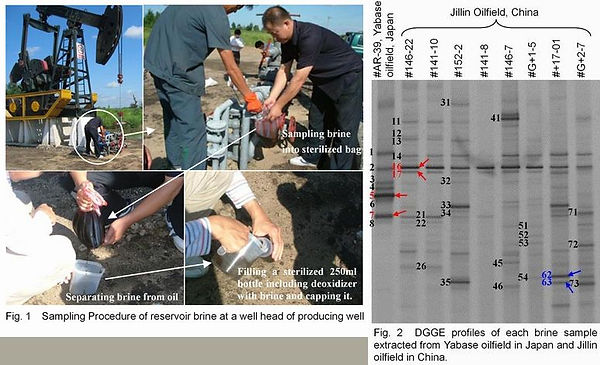Enhanced Oil & Gas Recovery and Reservoir Characterization


Technical & Support S
Yuta Yoshioka
Visiting MSc student
(Aug. 3, 2012-Oct. 16, 2012)
with Kyushu Univ., Japan
Research topic: "Investigation of Autotrophic Bacteria and Oil-Degrading Bacteria Inhabit Oil reservoir for Microbial EOR without Injection of Organic Nutrients"
Molasses has been used as a nutrient for bacteria in Microbial EOR (MEOR), however, its cost has increased recently because of high demand of it for bio-ethanol. An MEOR field test using molasses has been carried out in the Jillin oilfield in China since 2000 and the current cost of the Chinese molasses became three times higher compared to it cost eight years ago. Hence, it will be difficult to use organic nutrients such as molasses for MEOR in the near future. As an alternative, we suggest using autotrophic bacteria and/or oil-degrading bacteria which can grow without sugar in MEOR. One of the main objectives of this research is to study the potential of MEOR using these bacteria without injecting organic nutrients using DNA analysis methods. Reservoir brine was extracted from well heads of 14 producing wells in oilfields in Japan, China and Oman (Fig.1). Microbial genomic DNAs were extracted from the brine and amplified by polymerase chain reaction (PCR). Amplified DNAs were separated by their nucleotide sequence using denaturing gradient gel electrophoresis (DGGE) method. The DGGE profiles of Japanese and Chinese brine are shown in Fig.2. Nucleotide sequences of each DNA band were analyzed and the species of each bacterium were identified. DNA bands of No.5, No.7, No.16 and No.17 were identified as Geobacter sp., Moorella sp., Desulfotalea sp. and Nitratiruptor sp., respectively which were anaerobic autotrophic thermophiles. In particular, Geobacter sp. was observed with high concentration (>1.0 x 105cells/ml) in the Japanese brine using DNA quantifying method. DNA bands of No.62 and No.63 were identified as Halomonas sp. which was an anaerobic oil-degrading bacteria and could grow under high salinity condition. These results show that many kinds of autotrophic bacteria and oil-degrading bacteria inhabit oil reservoir universally and MEOR using these bacteria without injection of organic nutrient such as molasses is promising.

